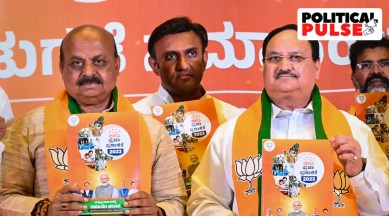Uttarakhand, Gujarat, Himachal Pradesh and now Karnataka: How BJP is advancing its UCC agenda
After the party promised a panel on UCC in Uttarakhand and won the 2021 Assembly elections in the hill State, the playbook was replicated in Gujarat and Himachal Pradesh.

The BJP on Monday promised to implement the Uniform Civil Code (UCC) in Karnataka if it returns to power, mentioning it in its election manifesto. The party had mentioned the UCC promise in its manifestos for the Gujarat and Himachal Pradesh elections last year. In the Karnataka manifesto, the party said it would introduce UCC “based on the recommendations of a high-level committee to be constituted for the purpose”.
The Uniform Civil Code aims to provide one law for the entire country, applicable to all religious communities in their personal matters such as marriage, divorce, inheritance, and adoption. The Constitution lists UCC among the Directive Principles of State Policy, which makes it a desirable objective but it is not justiciable.
The BJP has stepped up its efforts for UCC since last year. In May 2022, the Uttarakhand government of Pushkar Singh Dhami fast-tracked the process to set up a committee on the implementation of UCC, months after returning to power.
Though the UCC promise did not find a place in the “vision document” released on February 9, the BJP brought it up on the last day of campaigning. On February 12, just two days before the state was set to go to polls, Dhami announced that his government would form a committee of experts for a draft UCC.
“The security of the cultural and religious heritage of Uttarakhand, security of its environment and security of its borders is important not just for the state but the entire country. Soon after the oath-taking ceremony, the BJP government will form a committee of those with knowledge of the legal system, retired employees, prominent people from society, and other stakeholders to prepare a draft of the UCC,” Dhami said.
After the first Cabinet meeting of the newly formed government in March, Dhami announced his plans to set up the committee. In May, the state home department issued an order that read, “The Governor has given his permission to establish an expert committee to check all the relevant laws which control personal matters for people living in Uttarakhand, and to prepare a report on amendments in the present laws.”
The party adopted a similar approach before the Gujarat and Himachal elections last December. In October, ahead of the release of the poll schedule, Gujarat Home Minister Harsh Sanghavi announced that the Cabinet had decided to form a committee for the implementation of UCC. This was reaffirmed in the manifesto that was released on November 27. The manifesto promised to “ensure complete implementation of the Gujarat Uniform Civil Code committee’s recommendations”, among others. The BJP returned to power in the state, winning 156 of the 182 seats. Similarly, the BJP sankalp patra in Himachal Pradesh, released on November 6, promised to implement UCC.
On January 10 this year, the Supreme Court junked a public interest litigation (PIL) plea challenging the decision of the Gujarat and Uttarakhand governments to set up the expert committees. A Bench of Chief Justice of India D Y Chandrachud and P S Narasimha said the government’s decisions cannot be challenged as ultra vires the Constitution as they were within the powers of the state under Article 162, dealing with the extent of executive power of a state. “What is wrong with it? They have constituted a committee under their executive powers under Article 162…,” said Chandrachud.
Other states have also pitched for the UCC.
On May 1 last year, Assam Chief Minister Himanta Biswa Sarma spoke in its favour, asserting that it is an issue for all Muslim women. Sarma told reporters, “Everybody supports UCC. No Muslim woman wants that her husband brings home three other wives… do three marriages. Who would want that? This isn’t my issue, this is an issue for Muslim mothers and women.”
Months later, on December 1 last year, Madhya Pradesh Chief Minister Shivraj Singh Chouhan also spoke of the issue.
Asserting that “some fraud elements” are marrying women from tribal communities and taking over land in their names, he said everyone “should marry only once” and announced the decision to form a committee to look into implementation of Uniform Civil Code (UCC) in the state.
On April 23 this year, Uttar Pradesh deputy CM Keshav Prasad Maurya said the Uttar Pradesh government was thinking seriously in the direction of the implementation of the Uniform Civil Code in the state, Deputy Chief Minister
BJP leaders have also been pushing for it on the national stage.
On November 25, 2022, Union Home Minister Amit Shah, speaking at the Times Now Summit on “India: A vibrant democracy, global bright spot”, said UCC had been a promise of the BJP since its Jana Sangh days. “Not only the BJP, the Constituent Assembly also advised Parliament and states that UCC should come at an opportune time. For any secular country, laws should not be on the basis of religion. If a nation and states are secular, how can laws be based on religion? For every believer, there should be one law passed by Parliament or the state Assemblies,” he said.
The following month, BJP Rajya Sabha MP Kirodi Lal Meena triggered an Opposition uproar by introducing a Private Member’s Bill on the civil code.
In its monthly editorial this February, the RSS-linked magazine Indraprastha Samwad made a case for UCC saying: “Why should mosques, churches, and gurdwaras be allowed to manage their affairs and finances, while the government exercises control over affairs of temples, and why should Muslim women be deprived of alimony after divorce, when Hindu women are entitled to it?”